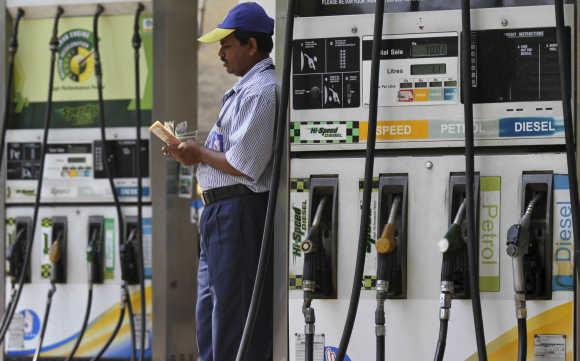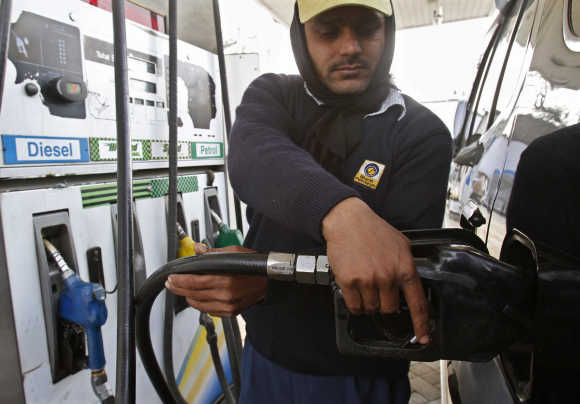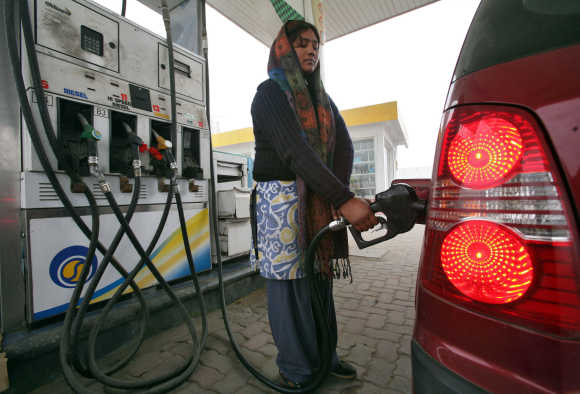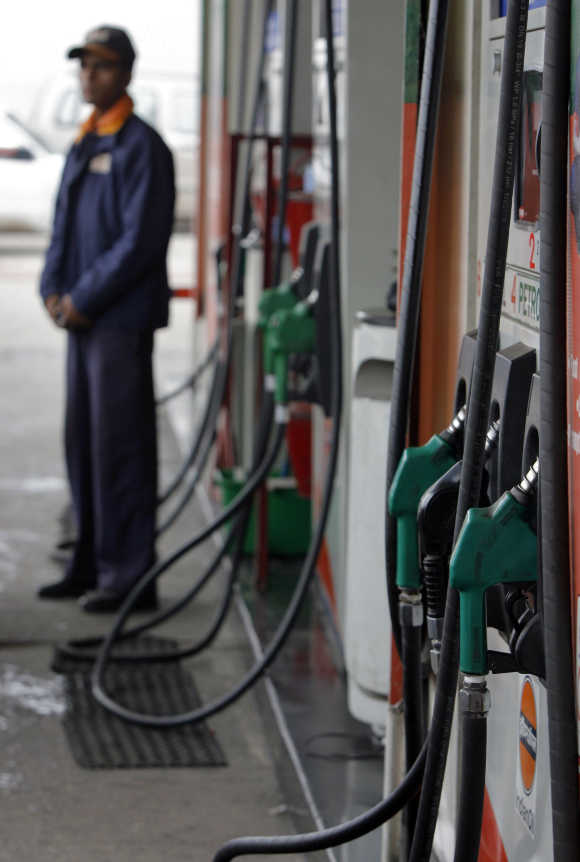Photographs: Rupak De Chowdhuri/Reuters
It will soon be two years since petrol was decontrolled, but few will happily celebrate this second birthday. The government-controlled oil companies that dominate the fuel market continue to sell petrol way below the market-determined price, exactly as was the case in the pre-decontrol era.
The promise made then to decontrol diesel prices and allow periodic adjustment in prices of kerosene and liquefied petroleum gas or LPG for domestic use is yet to be fulfilled.
Worse, political interference in pricing of petrol has not been discontinued, causing "decontrol" to be viewed as something as a farce.
...
Decontrol of oil price has become a farce
Image: An employee fills a vehicle with diesel at a fuel station in New Delhi.Photographs: B Mathur/Reuters
The policy change in June 2010 should have meant that some margins could be made on the sale of petrol, but state oil marketing companies have continued to lose money sharply through retail sales.
Oil companies are upset that they have to make huge losses on petrol sales - which go uncompensated, unlike for the three controlled petroleum products, diesel, kerosene and LPG.
The three companies lost Rs 2,200 crore (Rs 22 billion) in the first year of decontrol, and are estimated to have lost another Rs 5,000 crore (Rs 50 billion) in the fiscal year just ended.
...
Decontrol of oil price has become a farce
Image: A woman fills a vehicle with petrol at a fuel station in Jammu.Photographs: Mukesh Gupta/Reuters
This year looks no better. Some constituents of the ruling United Progressive Alliance have made their disagreement to price increases known; the Trinamool Congress has even threatened to pull out.
Decontrol has also failed miserably to bring a level playing field and competition to a market dominated by three state-controlled oil companies.
The cash flow of these maharatna and navratna oil companies remains affected, and their high-cost borrowing continues to surge.
Unsurprisingly, the companies are seeking government compensation for their losses on petrol, implying almost a formal return to the pre-decontrol era.
...
Decontrol of oil price has become a farce
Image: A worker stands at a fuel station in Jammu.Photographs: Mukesh Gupta/Reuters
On various occasions, oil companies as well as the government have claimed that the companies have the freedom to decide prices. But it's hardly a secret that their majority owner, the government, has the last word on the subject.
Early last year, oil companies didn't change prices for months as four states prepared for elections. This year, too, assembly elections in five states ensured that price increases were not passed on. Except, this year, there was no change even after the polls.
Despite the rhetoric from the oil companies' leadership of their intention to raise prices from April, no such increase happened.
...
Decontrol of oil price has become a farce
Image: A worker counts cash at a fuel station in Mumbai.Photographs: Danish Siddiqui/Reuters
The last price increase was more than five months ago - although companies are expected to review prices on a fortnightly basis. This is in spite of the fact that, meanwhile, the world price of oil has increased and the rupee has weakened further.
Any initial excitement over rapid re-opening of private outlets and their expansion has now run its course. Private players are back to square one, after seeing more than a 100 per cent jump in sales in the weeks immediately after decontrol.
With time, the price differential between public and private sector outlets started widening, since public sector companies did not raise prices regularly. Public-sector unwillingness to pass costs on to consumers affected the pricing of private retailers like Essar Oil and Reliance Industries.
If decontrol is to be followed in its true spirit, the oil companies will need to increase their price at the pump by around Rs 9 per litre, including taxes. A cash-strapped government cannot afford to postpone "biting the bullet".







article